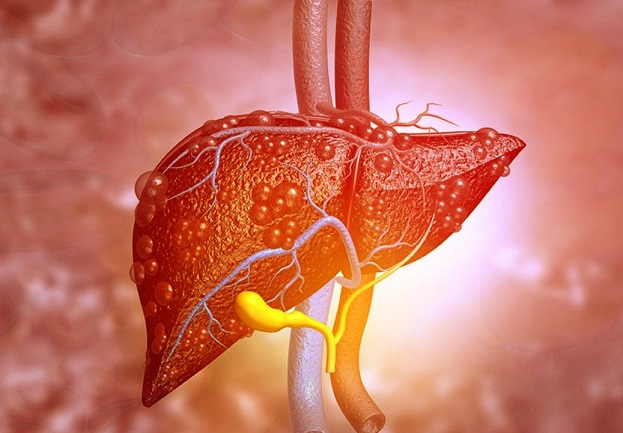COVID-19 Infections and More Notably COVID-19 Vaccines Are Triggering New Onset Autoimmune Hepatitis!
Nikhil Prasad Fact checked by:Thailand Medical News Team Feb 02, 2025 2 months, 1 week, 6 days, 3 hours, 13 minutes ago
Medical News:
The Rising Concern of Autoimmune Hepatitis Cases
Autoimmune hepatitis (AIH) is a rare but serious chronic liver disease in which the body’s immune system mistakenly attacks liver cells, leading to inflammation, liver damage, and potential liver failure if left untreated. Typically, AIH has been associated with genetic susceptibility and environmental triggers, but recent scientific findings are raising alarms about a new cause - COVID-19 infections and, more notably, COVID-19 vaccinations.
 COVID-19 Infections and More Notable COVID-19 Vaccines Are Triggering New Onset Autoimmune Hepatitis
COVID-19 Infections and More Notable COVID-19 Vaccines Are Triggering New Onset Autoimmune Hepatitis
As millions worldwide received vaccines to protect against SARS-CoV-2, reports have emerged linking COVID-19 vaccines to new-onset AIH. Cases of liver dysfunction following COVID-19 infection have already been documented, but an increasing number of post-vaccination AIH cases have led researchers to investigate potential mechanisms behind these occurrences.
This
Medical News report examines the latest research findings and case studies, highlighting the clinical implications and urging medical professionals to consider this emerging condition in post-vaccine evaluations.
The Link Between COVID-19 and Liver Dysfunction
Liver function abnormalities in COVID-19 patients have been a known phenomenon since the early days of the pandemic. Reports indicate that nearly 53% of infected individuals, regardless of preexisting liver conditions, displayed abnormal liver enzyme levels. SARS-CoV-2 appears to exert its impact on liver cells through multiple pathways, including:
-Direct hepatocyte infection: The virus can enter liver cells via ACE2 receptors, leading to direct cytopathic damage.
-Systemic inflammation: The heightened immune response in severe COVID-19 cases can contribute to liver injury through cytokine storms.
-Hypoxic liver injury: Respiratory distress associated with COVID-19 can result in oxygen deprivation, affecting liver function.
-Drug-induced liver injury: Medications used to treat COVID-19, such as remdesivir and steroids, have been linked to liver damage.
While these mechanisms explain liver dysfunction during infection, the emergence of AIH cases after vaccination points to an immune-mediated response that warrants closer investigation.
AIH Cases Triggered by COVID-19 Vaccination
As vaccination programs rolled out worldwide, medical professionals began documenting cases of AIH occurring shortly after vaccine administration. The vaccines linked to these cases include:
-mRNA Vaccines (Pfizer-BioNTech and Moderna)
-Viral Vector Vaccines (AstraZeneca and Johnson & Johnson)
-Inactivated Virus Vaccines (Sinovac and Covaxin)
;
The onset of AIH symptoms ranged from a few days to several weeks post-vaccination. Common symptoms reported included:
-Jaundice (yellowing of skin and eyes)
-Fatigue and malaise
-Nausea and vomiting
-Abdominal discomfort and liver tenderness
-Elevated liver enzymes (ALT, AST, and bilirubin levels)
-Presence of autoantibodies (ANA, SMA, LKM-1)
Case Studies: AIH Post-Vaccination
The study analyzed numerous case reports, detailing individuals who developed AIH following COVID-19 vaccination. Some notable cases include:
-Case 1: A 52-Year-Old Woman with No Prior Liver Disease
A 52-year-old woman received her second dose of an inactivated COVID-19 vaccine and, within two weeks, developed symptoms of severe jaundice and fatigue. Laboratory tests showed significantly elevated ALT and AST levels. Liver biopsy confirmed AIH, and she was started on corticosteroid therapy, which led to gradual improvement.
-Case 2: A 36-Year-Old Healthcare Worker
A 36-year-old female healthcare worker with no prior history of autoimmune diseases developed acute AIH 26 days after receiving the AstraZeneca vaccine. Blood tests revealed ANA positivity (1:160), elevated IgG levels, and liver enzyme abnormalities. Treatment with prednisolone led to recovery, but the patient required long-term immunosuppression to maintain remission.
-Case 3: A 63-Year-Old Man with No Autoimmune History
A 63-year-old male developed severe liver dysfunction seven days after receiving the Moderna mRNA vaccine. Unlike previous cases, his symptoms included epigastric pain and significant liver enzyme derangement. Autoantibody tests confirmed AIH, and a liver biopsy revealed severe inflammation. The patient responded well to high-dose steroids but experienced a relapse upon tapering the medication.
Understanding the Mechanisms: How COVID-19 Vaccines Trigger AIH
Researchers propose several mechanisms that could explain how COVID-19 vaccines might trigger AIH:
-Molecular Mimicry: The immune system may mistakenly attack liver cells due to structural similarities between vaccine antigens and liver proteins.
-Bystander Activation: Vaccine-induced immune stimulation may activate dormant autoreactive T-cells, leading to an attack on liver tissues.
-Epitope Spreading: The vaccine-triggered immune response may expand to include liver antigens, worsening autoimmune reactivity.
-Adjuvant-Induced Immune Stimulation: Vaccine adjuvants designed to enhance immunity may also overactivate the immune system in genetically susceptible individuals.
Treatment and Management of Vaccine-Induced AIH
Management of AIH following vaccination follows the standard approach for AIH treatment, including:
-Corticosteroids (Prednisolone): First-line therapy for AIH, helping to reduce inflammation and suppress the immune response.
-Immunosuppressants (Azathioprine, Mycophenolate Mofetil): Used in patients requiring long-term suppression to prevent AIH relapse.
-Liver Function Monitoring: Regular liver enzyme tests for those experiencing post-vaccine symptoms.
Public Health Implications: Balancing Vaccine Benefits and Risks
Although the risk of AIH following COVID-19 vaccination remains low, these cases highlight the need for heightened awareness and early detection. Vaccination remains the best defense against COVID-19 and its complications, but medical professionals should:
-Recognize potential post-vaccination AIH symptoms.
-Encourage at-risk individuals to undergo liver function monitoring after vaccination.
-Consider genetic predisposition screening for individuals with a family history of autoimmune diseases before vaccination.
Conclusion
The increasing reports of AIH following COVID-19 vaccination demand further research to establish definitive causality and refine vaccine safety measures. While the benefits of COVID-19 vaccination far outweigh the risks, recognizing rare but serious complications like AIH is critical for timely diagnosis and intervention. Physicians should remain vigilant and conduct thorough assessments of patients presenting with unexplained liver dysfunction post-vaccination.
The study findings were published in the peer-reviewed journal: Frontiers in Immunology.
https://www.frontiersin.org/journals/immunology/articles/10.3389/fimmu.2025.1510770/full
For the latest COVID-19 News, keep on logging to Thailand
Medical News.
Read Also:
https://www.thailandmedical.news/news/breaking-covid-19-news-scientists-from-university-of-texas-warn-that-sars-cov-2-can-also-cause-seronegative-autoimmune-hepatitis-in-adults
https://www.thailandmedical.news/news/covid-19-news-mysterious-pediatric-hepatitis-infections-were-actually-autoimmune-hepatitis-triggered-by-covid-19-due-to-t-cell-cross-reactivity
https://www.thailandmedical.news/news/breaking-news-canadian-researcher-warns-that-covid-19-vaccination-can-cause-autoimmune-hepatitis-in-some
https://www.thailandmedical.news/news/breaking-german-study-published-in-peer-reviewed-journal-indicates-that-covid-19-shots-can-induce-cd8-t-cell-dominant-hepatitis
https://www.thailandmedical.news/news/breaking-hepatitis-b-uae-covid-19-case-study-indicates-that-covid-19-could-induce-hepatitis-b-virus-reactivation
https://www.thailandmedical.news/news/singapore-case-study-reveals-that-even-mild-covid-19-can-trigger-fatal-liver-failure-in-patients-with-autoimmune-liver-disease
